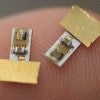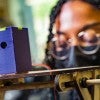
Keck backs Rice bid to ‘build a brain’
A $1 million Keck Foundation grant will support work by Jacob Robinson to understand neural pathways.

Keck backs Rice bid to ‘build a brain’
A $1 million Keck Foundation grant will support work by Jacob Robinson to understand neural pathways.

Bioengineering department adds single-cell expert via CPRIT grant
The little things of life mean a great deal to Julea Vlassakis, who will bring her study of protein complexes and their role in cancer proliferation to Rice University this year.

Study examines how breast implant surfaces affect immune response
Rice University bioengineers collaborated on a six-year study that systematically analyzed how the surface architecture of silicone breast implants influences adverse side effects.

Sickle cell advance incorporates Rice lab's tech
Rice University bioengineer Gang Bao, a pioneer in the search for a way to treat and perhaps cure sickle cell disease, is co-author of a significant step forward revealed in Science Translational Medicine and led by his colleagues at Stanford University.

NIH grant boosts computational search for cancer drugs
Computer scientist Lydia Kavraki of Rice University’s Brown School of Engineering has won a prestigious National Institutes of Health U01 grant to develop a new approach to model and analyze protein-ligand interactions in cancer research.

Grande-Allen named fellow of medical and biological engineering academy
Bioengineer Jane Grande-Allen has been named one of 26 fellows of the International Academy of Medical and Biological Engineering for 2021.

Engineered organism could diagnose Crohn's disease flareups
Rice University researchers have engineered a bacterium capable of diagnosing a human disease, a milestone in the field of synthetic biology.

Bio-inspired scaffolds help promote muscle growth
Rice University bioengineers are fabricating and testing tunable electrospun scaffolds completely derived from decellularized skeletal muscle to promote the regeneration of injured skeletal muscle.

Timing is everything in new implant tech
Rice engineers' wireless implants now allow for multiple stimulators to be programmed and magnetically powered from a single transmitter.

Brain Drain team tops Engineering Design Showcase
A student-designed implantable pump to help relieve pressure on the brains of patients with normal pressure hydrocephalus or idiopathic intracranial hypertension has won the top prize in this year’s Brown School of Engineering Design Showcase.

Help may be at hand for hair-pulling
People who compulsively pull their hair – suffering from an affliction known as trichotillomania – could find relief with a device created by Rice University students.

Rice names architect for new engineering and science building
With the imminent demolition of Rice University’s Abercrombie Engineering Laboratory, the space will soon be cleared for a new engineering and science building, according to Rice administrators. International architecture firm Skidmore, Owings & Merrill (SOM) has been selected as lead architect for the new building. Houston’s Scientia Architects will consult on laboratory design.

Brain drain could give patients peace of mind
Pressure from excess cerebrospinal fluid on the brain is often relieved by surgically installing a shunt that carries the fluid to a reservoir. But when pressure in the reservoir itself is too high, the shunt needs a little help.

Touchless temperature made simple
Getting around during the pandemic often requires getting your temperature taken to check for COVID-19. A team of seniors at Rice’s Brown School of Engineering wants to make that practice more practical for facilities around the world.

Undergraduate research showcase returns to Rice in hybrid format April 21
Linda Liu and Anika Sonig wanted to make sure all bases were covered when they planned this year’s Rice Undergraduate Research Symposium (RURS), the annual showcase for student research projects that’s operating under pandemic conditions for the second year in a row.